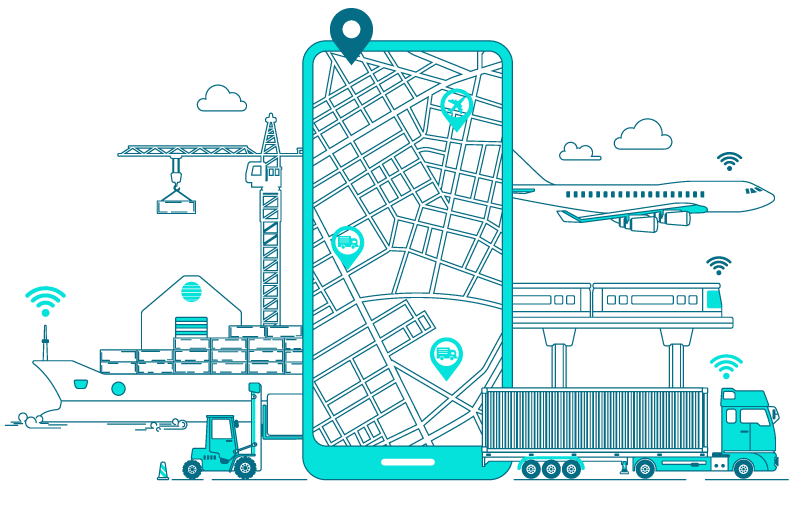Introduction
In the fast-paced world of logistics and fleet management, real-time tracking technologies have become indispensable tools for enhancing operational efficiency, optimizing routes, and ensuring the security of goods in transit. Among the innovative solutions available, Multi-Mode Logistics Tracking stands out as a dynamic trio that combines the strengths of GPS (Global Positioning System), SIM (Subscriber Identity Module) cards, and FASTag to provide comprehensive, accurate, and cost-effective tracking solutions. how each of these technologies plays a crucial role and the benefits they bring to logistics and fleet management.
GPS (Global Positioning System) Tracking

GPS tracking is a satellite-based navigation system that uses a network of satellites to pinpoint the exact location of vehicles, assets, or shipments in real time. how GPS contributes to logistics and fleet management:
- Precise Real-Time Tracking: GPS enables logistics companies to track their vehicles with pinpoint accuracy, offering real-time updates on their location, speed, and direction of travel.
- Route Optimization: By knowing the precise location of each vehicle, logistics managers can optimize routes, reduce idle time, and minimize fuel consumption, resulting in significant cost savings.
- Improved Customer Service: With GPS tracking, logistics companies can provide customers with accurate and timely delivery updates, enhancing transparency and customer satisfaction.
- Safety and Security: GPS tracking enhances the security of goods in transit, allowing companies to monitor unauthorized stops or route deviations, and respond swiftly to potential security threats.
SIM (Subscriber Identity Module) Card-Based Tracking

SIM card-based tracking utilizes cellular networks to communicate with vehicles and track their movements. how SIM cards play a role in logistics and fleet management:
- Wider Network Coverage: Unlike GPS, which relies on satellite signals, SIM card-based tracking works on cellular networks, providing coverage in areas with weak or no GPS signals, such as urban canyons or remote locations.
- Two-Way Communication: SIM cards enable two-way communication between the logistics company and the vehicle, facilitating real-time updates, instructions, and alerts.
- Cost-Effectiveness: SIM card-based tracking systems often have lower upfront costs compared to GPS, making them a cost-effective option for logistics companies, especially those with smaller fleets.
- Data Analytics: SIM card tracking can gather information on vehicle performance, driver behavior, and fuel usage, offering useful insights for streamlining fleet operations and increasing productivity.
FASTag

Initially introduced for electronic toll collection, FASTag has found applications beyond toll plazas, including fleet management. how FASTag benefits logistics companies:
- Streamlined Toll Collection: FASTag enables seamless and faster passage through toll plazas, reducing transit times and minimizing delays in freight movement.
- Cost Savings: Reduced wait times and improved fuel efficiency due to faster toll payments translate to cost savings for logistics companies.
- Centralized Payment and Data Tracking: FASTag offers centralized payment systems and data tracking, streamlining financial transactions and ensuring accurate toll data records.
- Integration with Fleet Management Software: FASTag data can be integrated with fleet management software, providing comprehensive tracking and analysis of vehicle movement and expenses.
Benefits from Axestrack multi-mode tracking
- Unified Platform: Axestrack’s Multi-Mode Tracking Solution brings all your fleet data under a single unified platform, making it easier than ever to manage and analyze your fleet’s performance.
- Real-Time Tracking: Stay in control at all times with real-time tracking of your vehicles. Monitor their locations, routes, and activities live on a user-friendly map interface.
- Advanced Analytics: You will gain valuable insights into your fleet’s performance. Analyze fuel consumption, driver behavior, idle times, and more to make data-driven decisions that enhance your fleet’s productivity and reduce costs.
- Customizable Alerts: Set up custom alerts for various events such as speed violations, unauthorized stops, or maintenance reminders. Stay informed of critical incidents and proactively manage your fleet’s safety and efficiency.
- Integration and Compatibility: Various GPS devices are compatible with our multi-mode tracking solution, which interacts smoothly with your current fleet management systems. You don’t have to spend money on completely new hardware or software.
- Improved Customer Service: With accurate tracking data, you can provide your customers with real-time updates on their deliveries, enhancing customer satisfaction and loyalty.
The Impact on Indian Logistics
- Efficiency and Cost Savings: Real-time tracking technologies have streamlined logistics operations, resulting in reduced transit times, optimized routes, and better resource utilization. This, in turn, has led to cost savings for logistics providers and improved service levels for customers.
- Improved Customer Experience: Real-time tracking enables logistics companies to give clients precise and clear information on their shipments. This has boosted customer satisfaction and loyalty, as clients can track their deliveries in real-time and receive timely updates about potential delays or deviations.
- Enhanced Security: Real-time tracking has significantly improved the security of shipments, as logistics managers can monitor cargo at every stage of the supply chain. In case of theft or unauthorized access, swift action can be taken to recover the goods.
- Compliance and Accountability: Real-time tracking helps logistics companies comply with regulatory requirements, such as adhering to speed limits and driver rest periods. It also enhances accountability by providing an accurate record of vehicle movements and driver behavior.
- Data-Driven Decision Making: The data collected through real-time tracking systems is a goldmine of insights. By analyzing this data, logistics companies can identify bottlenecks, optimize processes, and make data-driven decisions to improve overall efficiency.
Conclusion
Multi-Mode Logistics Tracking, combining GPS, SIM, and FASTag technologies, is revolutionizing fleet management in the logistics industry. The precise real-time tracking capabilities of GPS, the wide network coverage and cost-effectiveness of SIM card-based tracking, and the streamlined toll collection of FASTag collectively contribute to operational efficiency, cost savings, and enhanced security in the transportation of goods. By leveraging the strengths of each technology, logistics companies can optimize routes, improve customer service, and ensure the safety and timely delivery of goods. Embracing this dynamic trio is a strategic move that empowers logistics businesses to stay competitive in an ever-evolving and demanding market.

